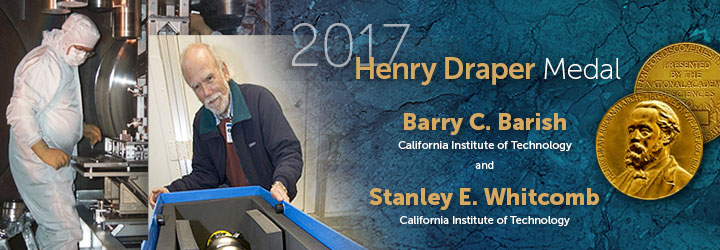Barish and Whitcomb banner

Barry C. Barish, Linde Professor of Physics, Emeritus at California Institute of Technology, and Stanley E. Whitcomb, LIGO Laboratory Chief Scientist at California Institute of Technology, received the 2017 Henry Draper Medal.
Together, Barish and Whitcomb led the large and talented team that built and operated the Laser Interferometer Gravitational-Wave Observatory (LIGO). LIGO’s twin 4-kilometer-long detectors, in Louisiana and Washington, made the 2015 discovery of gravitational waves from colliding black holes, directly validating Einstein's 100-year-old prediction of gravitational waves and ushering in a new field of gravitational wave astronomy.
Barish joined LIGO at a crucial time in 1994. As LIGO Director, his experience with large high energy physics experiments made him uniquely suited to balance the conflicting needs as the scientifically challenging tabletop-scale project grew to a robust multi-kilometer experimental facility. He conceived and created two related entities: the LIGO Laboratory, which managed, designed, built, operated and maintained the LIGO instruments while carrying out needed research; and the LIGO Scientific Collaboration (LSC), which expanded the research team by drawing in more than 1,000 researchers from around the world, thereby enabling the project’s eventual success.
Whitcomb joined the gravitational wave effort in 1980 and participated in the early experimental work that proved the feasibility of making such precise measurements. He led the team within the LIGO Laboratory that designed and commissioned the first generation full-scale LIGO detectors. At one point or another, he was involved in virtually every aspect of LIGO’s work. Along the way, he helped train the team of scientists and engineers that designed and built the Advanced LIGO detectors that eventually made this historic detection.
The Henry Draper Medal is awarded every four years and is presented with a $25,000 prize. The Medal honors a recent, original investigation in astronomical physics, of importance and benefit to science to merit such recognition. "Recent" is defined as a major publication resulting from the investigation should have appeared since the last presentation of the award (2013).

